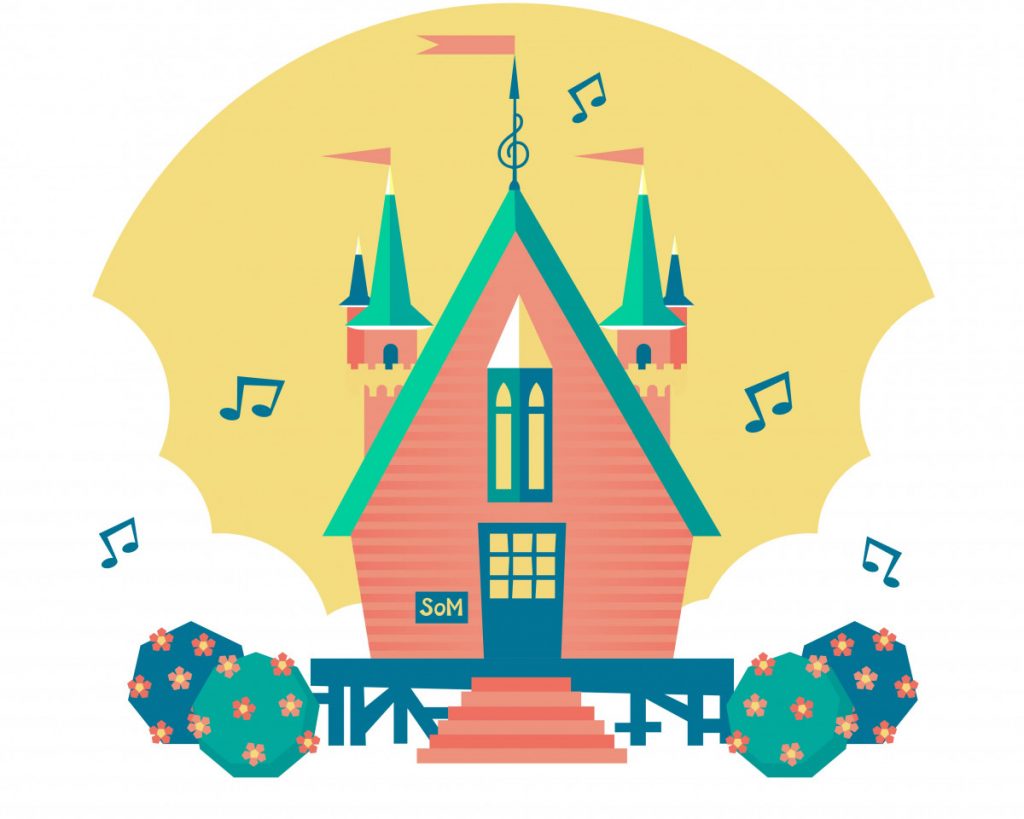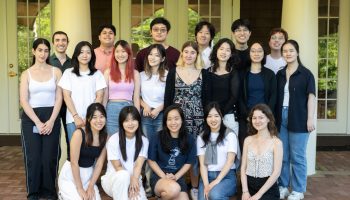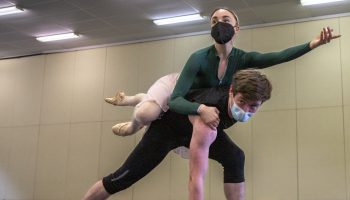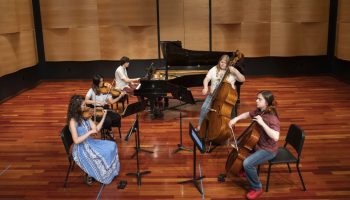
Fairy tales and picking flowers — both seemingly lighthearted activities on the surface, but for the third voice recital of the season, School of Music voice students are looking deeper, playing on the dark tones buried underneath.
Lucy Evans, a mezzo-soprano from Northwestern University, will perform three cycles from Benjamin Britten’s “A Charm of Lullabies,” Op. 41, including “A Cradle Song,” “A Highland Balou” and “Sephestia’s Lullaby.” The collection includes five songs based on poems by William Blake, Robert Burns, Robert Greene, Thomas Randolph and John Phillip.
“They are all settings of English and Scottish poems for children, but each is creepy in its own sense,” Evans said. “I don’t think they get performed often at all, so it’s usually something different and unexpected for any audience. They are completely underrated.”
In all three, Evans said she takes on the role of a child’s caretaker who is “either stressed or upset,” often touching on themes of death or the trials the children will face throughout their lives.
“I am speaking on the fears I have for the child’s future, or the stress of being a single mother,” she said. “So many of the stories we tell to children, even fairy tales, have a dark side or element to them, but the way (Britten) sets the text brings it out in an unsettling way.”
Evans, joined by seven additional students from the Chautauqua School of Music Voice Program, will perform at 7 p.m. EDT on Wednesday, July 29, on the CHQ Assembly Virtual Porch.
Luisa Hidalgo, a soprano from the Eastman School of Music, will sing the first two selections from Richard Strauss’s “Brentano Lieder,” Op. 68, including “An die Nacht” and “Ich wollt ein Sträußlein binden.” Both were composed in 1918 for soprano and piano. Also known as “Sechs Lieder,” the collection is set to poems by German poet Clemens Brentano.
“They are epic poems, almost like prose, but they are all slightly ambiguous,” she said. “You have to work to find your own interpretation.”
“An die Nacht,” meaning “holy night,” is about a woman who is embarking on a “significant rite of passage,” or coming of age, Hidalgo said.
“This song speaks in a borderline erratic, yet stirring light,” she said. “It is almost like a mini opera within itself.”
“Ich wollt ein Sträußlein binden” is a “somber story,” Hidalgo said. It begins with Hidalgo singing as herself, on her way to pick a flower in a field. In the middle of the piece, the perspective shifts, making Hidalgo the flower.
“It sounds strange, but the story I am telling as the flower is still very human,” she said. “I am basically asking this person who is about to pick me to spare my life and give me another chance.”
The song presents a “very disheartening metaphor for love,” Hidalgo said, accompanied by a satirical tone of voice.
“It is basically alluding to this concept that love ends that way in every form, that love is eventually going to pick your heart out,” she said.
Seyquan Mack, a tenor from the Oberlin Conservatory, will perform Henri Duparc’s “L’invitation au Voyage” and “Phidylé,” two “sorrowful selections.” Mack will begin with “L’invitation au Voyage,” composed in 1870 and a setting of two of three verses of French poet Charles Baudelaire’s poem describing his love of the countryside in Holland and the longing of a man wishing to be with his lover.
“You can almost visualize what is happening in the piano accompaniment partnering with the vocals,” Mack said. “His compositions are so full of imagery; it’s truly a joy to experience.”
Mack said Duparc, a French composer, frequently combined the soft simplicity of art songs with dramatic operatic elements, of which “Phidylé” is a prime example. “Phidylé” was dedicated to his friend and French Romantic composer Ernest Chausson. It is a setting of a poem with the same title from French Parnassian poet Leconte de Lisle’s Poèmes et poésies.
“It has a peaceful entrance, but the piece ends with a big, triumphant moment, which is something you see a lot in his music,” he said. “As a vocalist, it gives me a lot to play with.”
Jaime Sharp, a mezzo-soprano from the University of Michigan, will perform Florence Price’s “An April Day” and Brandon Spencer’s “Dream Variation.”
It has such a summery, blissful tone to it,” Sharp said. “This piece makes me just as happy to sing as it does to listen to it. Florence is one of my favorites composers of all time because she has this unmatched ability to make beautiful music that soothes the soul. I really hope it does that for the audience as well.”
The better known version of Spencer’s “Dream Variation,” is that of Margaret Bonds’ “Three Dream Portraits,” which is set to the same text from poet Langston Hughes, found in his collection The Dream Keepers and Other Poems. Spencer is a Black composer, and Sharp said the piece is distinctly written from the “perspective of the Black experience.”
“Brandon is a good friend of mine, and we both agreed this is a piece that is important to hear from a Black singer’s standpoint,” she said. “While the sound has an upbeat tempo, the text is fairly heavy and layered.”
The music is whimsical, as if to suggest the speaker’s desire for freedom of movement. Sharp said in its “sense of effortlessness,” Price’s “An April Day” is a contrasting work that brings a “certain lightness along with it.”
“It has such a summery, blissful tone to it,” Sharp said. “This piece makes me just as happy to sing as it does to listen to it. Florence is one of my favorites composers of all time because she has this unmatched ability to make beautiful music that soothes the soul. I really hope it does that for the audience as well.”




